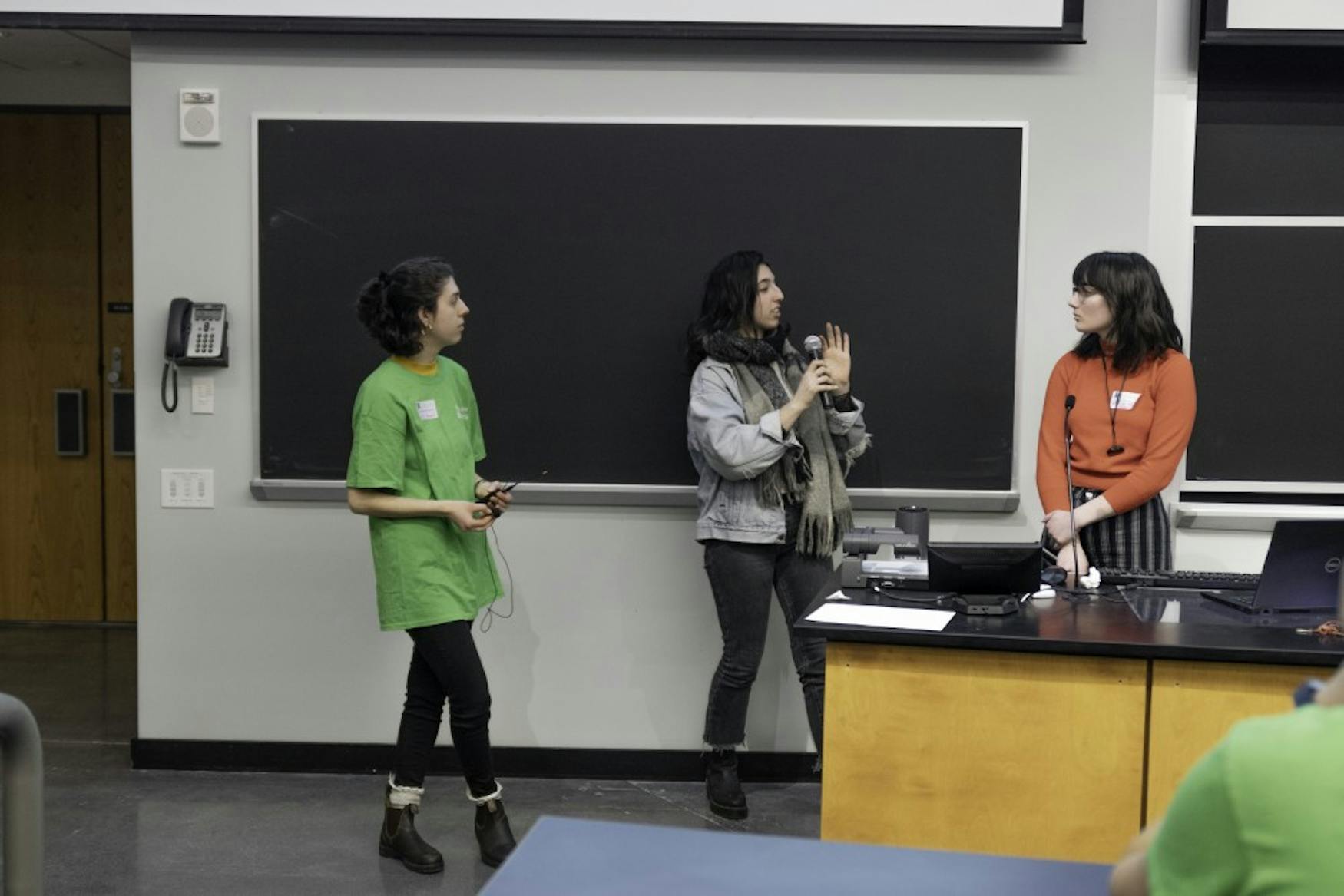Students discuss campus sustainability practices
This year’s Student Sustainability Leadership Symposium was held at Brandeis.
Brandeis and Wellesley College co-hosted this year’s annual Student Sustainability Leadership Symposium on Sunday. Students from colleges all over New England, including Tufts University, the University of Connecticut, Bentley University and Boston University, gathered at Brandeis to discuss and learn more about sustainability issues and practices. The symposium featured presentations given by students and professionals.
Dylan Husted, an alumnus of Babson College and the founder and CEO of SaveOhno, gave a presentation on his competitive online game. In SaveOhno, teams of students compete to see who can perform the greatest number of sustainable actions in real life and earn the most points in the game. By taking these sustainable actions, students are “saving” Ohno, who represents their future grandchild living in the year 2100. The team with the most points wins custom embroidered Patagonia fleeces.
Husted described the sustainable actions as an “engagement escalator of activities.” For example, the challenge on the first day of the competition might be to use a refillable water bottle or sign an online petition, while later on in the competition, the challenge might be to attend an environmental studies lecture or volunteer to plant trees. Students earn points by taking pictures of themselves doing an action and posting them to SaveOhno.
According to Husted, 40,000 actions have been taken at 11 different colleges since it was launched in 2014, including Brandeis. Brandeis is participating in SaveOhno again this year. The competition began on Sunday and will go until March23, according to a Facebook event created by Sustainable Brandeis. The Brandeis student organizers for SaveOhno are Sabrina Chow ’21 and Sage DeChiara ’21.
Chow gave her own presentation at the symposium, speaking about the Student Union’s Senate Sustainability Committee. According to Chow, the committee is working on banning plastic water bottles from being sold on campus, hosting a meatless Monday in a Brandeis dining hall and other sustainability initiatives.
Chow also discussed the Brandeis Sustainability Fund (BSF), which provides financial support for student-led sustainability initiatives. BSF’s biggest project was putting LED lights into the Shapiro Campus Center, Chow said. These lights are more environmentally-friendly and made the building brighter, and according to Chow, the project cost $90,000.
The final sustainability group Chow talked about was the Brandeis Sustainability Ambassadors. According to Chow, this student group aims to promote sustainability by advocating for environmental movements on campus, participating in first-year orientation, helping offices become more environmentally conscious.
Meredith Levy ’21, Anna Kate Rattray ’21 and Orly Strobel ’21, leaders of the Brandeis chapter of Planetary Health Alliance, discussed the impact they wanted to make regarding sustainability on campus. They emphasized that an important characteristic of the club was that it is interdisciplinary — they try to appeal to many kinds of students with different majors, minors and interests. Rattray pointed out that as a neuroscience major, sustainability is not a large part of her academic coursework, but Planetary Health Alliance allowed her to be involved. Also, the student leaders said they are planning an event that is targeted toward Arts and Humanities students called Planetary Health Alliance Panel.
In another student presentation, Jen Harris and Clare Auld-Brokish talked about their efforts as student interns at the Wellesley Sustainability Office to make transportation more sustainable. Because of their suburban campus, it can be hard for Wellesley students and faculty to get around without a car, said Harris and Auld-Brokish. As one possible solution, they started a bikeshare program that allows students to rent bikes for 24 hours at a time for free. Harris and Auld-Brokish said they held events on their campus to raise awareness about the program, such as weekend bike trips to the Natick Farmers’ Market.
Next, these students are hoping to get Wellesley staff and faculty to use Miles2Share, an app that encourages carpooling by connecting users who have compatible routes and schedules. According to Harris and Auld-Brokish, not only does the app promote sustainable transportation, it facilitates meeting new people.
University of Connecticut Sustainability Office student interns Mara Tu and Natalie Roach discussed their work trying to make their campus more environmentally friendly. They talked about their ECOCoin initiative, which aims to reduce the number of plastic bags that their bookstore gives out. According to Tu and Roach, cashiers ask customers if they want a bag or an ECOCoin. If the customer selects ECOCoin, they can donate the coin to charity. Each coin equals five cents, so rather than spending five cents on a plastic bag that creates more waste, this money goes to a good cause.
Professionals also gave presentations about their sustainability work. One presenter, Oceans Fellow Kelsey Lamb, talked about the initiatives of the organization she works for, Environment America Research and Policy Center. According to Lamb, Environment America works on issues relating to greenhouse gases, clean water, renewable energy, and more.
Other students who spoke include Elyssa Anneser, Kayla Williams, Aviva Musicus, Rebecca Grekin and Vivian Song. The presentations culminated with a lunch in Sherman Function Hall, a career panel and a networking session.




Please note All comments are eligible for publication in The Justice.